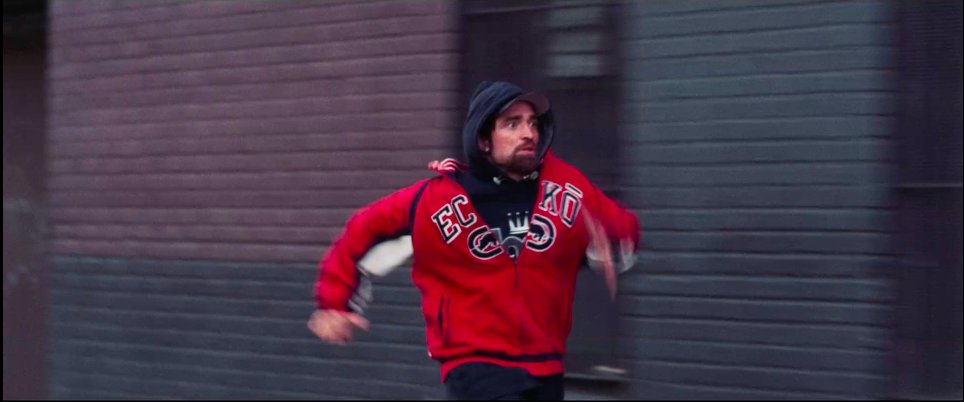
As sleek as they’re deceptively slack, the last couple of films by Queens natives (and brothers) Ben and Josh Safdie are, in more ways than one, of a piece. At once gritty and otherworldly, embedded in and besotted by a kitchen-sink visionary version of New York City as refracted through a tunnel-prism of alienated solipsism, with lead characters whose manic forward-motion buzzes in a cauldron of severely restricted circumstance and/or narcotic fugue, both Heaven Knows What (2015) and Good Time (opening on August 25th at the Kendall and elsewhere) are dazzling, bravura feats of compressed momentum. Together they establish the Safdies as consummate filmmakers in peak form, equally committed to spontaneity and design, and inclined towards a lyrical, often hysterical, finally melancholy dislocation.
Dislocation of various sorts pops up and out all over the place in Safdie films, in (dis)concert with discombobulation. People are, for starters, always fucking up climbing fences–it’s a running gaffe. I’ve noticed it in three films so far (Daddy Longlegs (2009), a gangly, Cassevetian riff on father/brotherhood being the third). The precariousness of relations among people–and between people and their navigable world, including fences–provides fodder for farce, fascination, and ruination throughout the Safdies’ oeuvre; the resulting unevenness of tone, jarring and bathos-tempting, is deliberate. In Heaven Knows What, a contagiously woozy cautionary ode to doomed love among utterly zonked young heroin addicts in New York, this tonal instability is salutary, creating ripples of goofy tenderness, for example, or bristling menace, within what easily could have been a steady-state of groggy emo gloom.
In their new film almost everything is intensified, accelerated, and generally amped up, so tonal instability is pushed to new levels, undermining, or threatening to, Good Time’s considerable audiovisual enchantments (which share more with early Wong Kar-Wai by way of early Michael Mann than they do with Cassavetes), and running some risk of confusing and losing viewers unable to roll with it. But the Safdies seem confident that most of us will run with it. That’s movie magic for you, after all–a confidence game, riddled with hurdles to keep things interesting. You can either take them in stride or go home in disgust; it’s a negotiation between you and your suspension of disbelief. In this case, I feel confident that most viewers will be happy to stay up in the air, however bumpy the ride.
Speaking of viewers, Good Time seems guaranteed to introduce the Safdie brothers’ headlong approach to obstacle-addled adventure to many more of them than ever before. That’s because, while it continues their practice of employing first-time actors (alongside such notable veterans as Barkhad Abdi, Jennifer Jason Leigh, and the always jaw-dropping motormouth Buddy Duress), it also stars a bona fide star, Robert Pattinson, who seized the opportunity–one he sought out himself, having contacted the Safdies after seeing a still (not even a trailer) from Heaven Knows What–to consolidate his efforts, begun in Cosmopolis (2012) and fortified by The Lost City of Z (2016), to be perceived as at least as serious an actor as Kristen Stewart, his twilit paramour of bloodsucking yore and present-day art-house dahling.
Opportunity seized; mission plenty accomplished. (But since his next film is with Claire Denis, I gather that Pattinson feels his work is not yet done.)

As written for Pattinson by Josh Safdie and Ronald Bronstein, the character of Connie Nikas is given even less backstory than his developmentally disabled brother Nick (Ben Safdie), about whom we learn via a therapy session that he fears his grandmother, due to at least one episode of mistreatment at her hands during childhood. It’s not much, but it impacts the plot at a critical point later on–this is lean storytelling; everything serves a purpose. (Which reminds me that, as in Heaven Knows What, both the opening and closing credits of Good Time roll over story sequences, such that the film’s action occupies its entire duration.)
Connie has a purpose, too: to be a somewhat scumbaggy, rat-faced (albeit, inevitably, not uncute) bundle of nerves with an ambiguous moral compass, whose stubborn conviction that he’s better than his life as a small-time hustler in working class Queens leads him to hatch a dumb bank-robbery scheme that lands his brother in jail and kicks Good Time’s clockwork into high-gear.
From here until its concluding tonal shift–a real doozy of a lurch; it doesn’t so much disorient as radically reorient the viewer, and may not work for everyone–Good Time hitches itself to Connie’s quest to locate and liberate his brother from captivity, and it’s a bona fide, breakneck thrill-ride, packed with picaresque incident, amusement parks in bad decline, mixed-up bodies, acid-filled Sprite bottles, teen exploitation; but also, passed through or over as quickly as everything else, real pain, pettiness, venality, even death. (No guns, though. Not one. You won’t miss them, I promise). So yeah, it’s a breakneck thrill-ride–all lunatic laughter until the Fire Ball flies apart and somebody loses, for instance, an eye.
Except that here the good mad times roll right through several such bangs, and they don’t exactly whimper their way to a close, either. I imagine there will be some arguments over Good Time’s conclusion, specifically whether it’s earned or apt. I go back and forth myself. Either it resolves the movie’s many tensions on a surprisingly, disappointingly sentimental tonic chord, or it transforms a merely thrilling tour-de-force–one lit up, I should add, like an ultravivid latticework by Oneohtrix Point Never’s brilliantly but unrigidly Berlin-schooled electronic soundtrack–into a moving meditation on love, family, and the possibility of replacing our utopian project to inhabit a better time with efforts to redeem the time we already have instead.
Good Time
2017
dir. Ben and Josh Safdie
100 min.
opening August 25th at the Kendall and elsewhere

